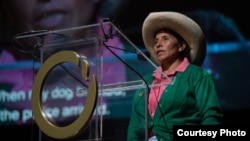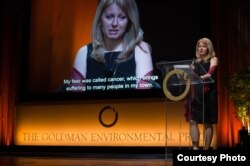A Peruvian potato farmer who was beaten and jailed after protesting against the loss of her land and home to a mining firm is among six winners of the Goldman Prize, one of the world's richest awards for environmental activists.
The winners, including a Tanzanian land rights campaigner, a Slovakian public interest lawyer and a Puerto Rican nature reserve developer, will be honored at a ceremony Wednesday in Washington D.C.
An initial ceremony was held April 18 in San Francisco, California.
Each winner will receive $175,000 to support their environmental activism and continuing local campaigns.
"People all over the world are fighting to protect their land and water," said Maxima Acuna, a Peruvian farmer, mother of four and grandmother, who won the prize for Latin America.
Her campaigning over more than five years eventually led to the suspension of the $4.8 billion Conga gold and copper mine project in the Peruvian highlands. Environmentalists feared the mine would have poisoned local water sources and displaced communities and individuals living and farming there.
Acuna's home in a remote area — a four-hour drive from Cajarmarca, the capital of the mountainous region — was destroyed as part of the mine project and the family's attempts to rebuild have been blocked several times since 2011.
Security forces backing the mining company's claim to the family's land have been accused of beating Acuna's elder daughter because of her activism, the 47-year-old farmer said.
"I stayed on my land and wouldn't leave," Acuna told the Thomson Reuters Foundation in a conference call. "Harassment from the mine and security guards is still heavy."
Mining companies at the center of the dispute have criticized the decision to award the prize to Acuna, saying the committee did not have "balanced or complete information about the land dispute or the events surrounding it."
Slovakian waste dump
Other winners included Slovakian lawyer Zuzana Caputova, who led successful efforts to prevent a waste dump from being built in her hometown of Pesinok.
Protests against the proposed dump were the largest mobilization of citizens in the region since the 1989 Velvet Revolution which helped end communism in Eastern Europe, the Goldman Prize committee said.
Edward Loure, a leader of Tanzania's indigenous Masaai, won the Africa prize for protecting more than 200,000 acres of communal land from investors.
Baltimore student Destiny Watford won the North American prize for launching protests which stopped an incinerator from being built less than a mile from her high school.
Luis Herrera won the prize for Island Nations after successfully establishing a nature reserve in Puerto Rico, protecting an important nesting ground for endangered sea turtles.
Cambodian forestry campaigner Leng Ouch won the Asian prize for exposing corruption in land deals, causing the government to cancel some large concessions.
Last year's winner of the Goldman Prize for Latin America, Honduran land rights campaigner Berta Caceres, was murdered in March, a crime condemned by environmentalists worldwide.







